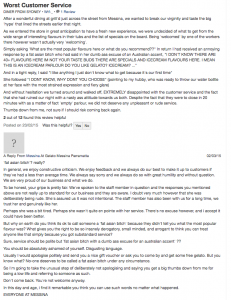The customer is always right… until they’re wrong. But who in business has the courage to tell that customer they are out of line?
What’s that I hear? The sound of silence with a few intermittent crickets?
Do you really have nothing to say to customers who publish inappropriate remarks on your social media networks?
The widespread adoption of ‘the customer is always right’ mantra across customer service focused businesses (and indeed the same can be said for the client/consultant and employer/employee relationship) is well intended, but the result is a prevailing culture of ‘yes-people’ who run for cover at the first sign of conflict. Critical thinking, skepticism, and robust discussions are actively avoided in favour of a philosophy that aims to make everyone right all of the time.
Customers expect – no demand, to be kept happy; and by and large we feed that sense of entitlement by trying to please everyone — often to our own detriment.
On social media in particular, the balance of power between a business and a customer is exceedingly disparate. Customers hold the balance of power because they count on the fact that businesses are afraid of public admonishment and will, more often than not, avoid public conflict. Businesses relinquish a portion of their social media power by being overtly afraid of having a voice, for fear of bad publicity, and social media anarchy.
Of course, often we only hear from our customers when they feel their expectations haven’t been met. The court of public opinion is where we first discover a complaint has been leveled via your business’ Facebook page, Twitter account, or in a review on a pseudo-social site like Urbanspoon or TripAdvisor.
Contrary to popular belief, I think the notion that ‘the customer is always right’ is an utter load of crap. Since when has keeping someone else happy at the detriment of your own business, wellbeing, or moral and ethical standards become the accepted norm?
I don’t buy it.
And business leaders: neither should you.
What would you say on social media if you weren’t afraid?
Learning how to pick your battles on social media is somewhere between an art and a science. Knowing your audience and cultivating a ‘village of support’ before you actually need one is all science; having the ability to craft assertive responses, definitely an art.
Let me be clear, I’m not suggesting that the majority of your complaints warrant an assertive response — but in a small handful of circumstances, you should consider the customer most definitely wrong and call them on their inappropriate remarks. Such situations may include:
- Racist, sexist, and any other discriminatory comment,
- Personal attacks on you or your staff; and
- Comments that incite violence or make threats.
The aim in such circumstances is to avoid being drawn into a public stoush by defining a clear line between objective commentary and subjective (emotive) remarks. Deal with the former in facts, while calling out the inappropriateness of the latter directly.
A great example is the response below from Gelato Messina to a comment made on their Urbanspoon page.
Click the image below to zoom in
Business leaders: be brave!
YOU are the judge of what is acceptable and appropriate on your social media networks. Having clear community guidelines published on your social media accounts is essential if you want to enforce particular standards.
Demonstrating strong leadership in response to an inappropriate remark or complaint posted on social media does more than just address the grievance concerned. It also sends a strong message to your workforce (and the public) that you will not tolerate inappropriate behaviour toward them. Everyone loves a leader who goes into bat for their workforce because it demonstrates a conviction of character that rightly prioritises being nice over being right.
Here are my top 5 tips for dealing with inappropriate behaviour on social media:
- There are always two sides to a story. Your customers and yours. Tell your story (truthfully)!
- Manage complaints received via social media (and pseudo-social sites such as Urbanspoon and TripAdvisor) early and thoroughly. Aim to get legitimate complainants offline as quickly as possible – don’t be led into an online debate.
- Investigate the veracity of a customer’s claims – not only to remediate the situation appropriately, but with a view to considering complaints as early warning indicators to possible broader, systemic service or product issues.
- Choose your words carefully. Use active language. Be clear. Be concise.
- Take a leaf out of the celebrities who read and respond to the mean tweets they receive on camera. The impact a short video can have on reaching your audience, and beyond, in responding to inappropriate behaviour cannot be underestimated.
What would you do on social media if you weren’t afraid?
ABOUT NICOLE MATEJIC
Nicole Matejic is CEO of global military think tank Info Ops HQ and is also known for her crisis communications acumen as the #SocialFirefighter® at Australia's Social Media Monster. A social media trainer and adviser to NATO and Governments around the world, Nicole's first book ‘Social Media Rules of Engagement' is out now! Available in Dymocks stores around Australia and in the iTunes and Amazon eStores. Nicole speaks to audiences on crisis communications and military information operations around the world and guest lectures at Universities around Australia.
Latest.

AI adoption failing isn’t the tech, it’s the people. How smart businesses overcome this.
Technology, Thought Leadership, Industry Trends

Temp-to-perm is the best way to hire today.
Hiring Insights

How to keep top talent: Strategies for successful onboarding
Hiring Insights, Ask Aquent, Training Resources



